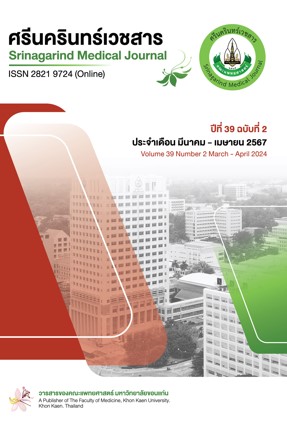Risk Factors of Metastatic Invasive Ductal Carcinoma in Thai Women at Surin Hospital
Keywords:
breast cancer, pathological finding, axillary lymph node metastasesAbstract
Background and Objective: Breast cancer is the leading cause of cancer death in Thailand. Pathology result affects both treatment and survival outcome which varied by factors of age, hormone receptor type, histopathology of cancer, size of the tumor, and axillary lymph node metastasis including estrogen receptor (ER) with progesterone receptor (PR) and human epidermal growth factor receptor (HER2) receptors status. This study aimed to verify pathological and related factors associated with axillary lymph node metastasis in patients breast cancer.
Methods: A retrospective descriptive study was performed in a group of patients who underwent a total mastectomy in which pathology reported invasive ductal carcinoma from October 2020 to September 2021.
Results: The study group had an average age of 59.01±12.67 years of which 93.81% of these were over 40 years. The average tumor size was 3.66±2.44 cm, HER2 receptor-positive 24.23%, ER/PR receptor-positive 43.3%, and Ki-67 expression (over 20%) was 64.77%. Factors correlated with axillary lymph node metastasis were 1) size of biopsy tissue between 2-5 cm, odds ratio (OR) was 2.16 with 95%CI 1.05-4.44 2) size of biopsy tissue over 5 cm, OR was 4.19 (95%CI 1.55-11.39 and 3) ER/PR receptor-positive, OR was 2.25 with 95%CI 1.09-4.61. While factors of age, positive HER2 receptor, severity of cellular pathology, and Ki-67 expression were not found relationship with axillary lymph node metastasis.
Conclusion: In a group of patients aged over 40 years; the size of the tumor and positive ER/PR receptor increased the risk of axillary lymph node metastasis. However, the severity of cellular pathology, Ki-67 expression, and positive HER2 receptor did not associate with axillary lymph node metastasis.
References
Health Organization. Breast cancer [Internet]. [cited Aug 15, 2023]. Available from: https://www.who.int/news-room/fact-sheets/ detail/breast-cancer
World Health Organization. International Agency for Research on Cancer. 764-thailand-fact-sheets. pdf [Internet]. [cited Aug 15, 2023]. Available from: https://gco.iarc.fr/today/data/factsheets/popula¬tions/764-thailand-fact-sheets.pdf
Imsamran W, Chaiwerawattana A, Wiangnon S, Pongnikorn D, Suwanrungrung K, Sangrajrang S, et al. Cancer in Thailand.[Internet]. [cited Feb 13, 2023]. Available from: https://www.nci.go.th/th/ File_download/Nci%20Cancer%20Registry/ Cancer%20in%20Thailand8.pdf
Mahmood H, Faheem M, Mahmood S, Sadiq M, Irfan J. Impact of age, tumor size, lymph node metastasis, stage, receptor status and menopausal status on overall survival of breast cancer patients in Pakistan. Asian Pac J Cancer Prev 2015;16(3): 1019–24. doi : 10.7314/apjcp.2015.16.3.1019.
Chantharakhit C. Correlation between age and prognostic factors in Thai breast cancer women: a single institute analysis. J Med Assoc Thai 2021;104(7):1153–8. doi: 10.35755/jmedassocthai. 2021.07.12508
Ratanachokthorani M, Sathitratanacheewin S. Hormone receptor status and clinical characteristics of breast cancer patients at Makarak Hospital: A retrospective observational study. J Med Biosci 2019;1(2):125–33.
Nimboriboonporn A, Sa-nguanraksa D, Samarnthai N, Thumrongtaradol T, Phumphuang S, O-charoenrat P. Predictive factors for sentinel lymph node metastasis and validation of memorial sloan–kettering cancer center nomogram in Thai breast cancer patients: predictive factors for sentinel node metastasis. Thai J Surg 2020 30;41(2):29–39.
Avci O, Tacar SY, Seber ES, Yetisyigit T. Breast cancer in young and very young women; is age related to outcome? J Cancer Res Ther 2021;17(6):1322–7. doi: 10.4103/jcrt.JCRT_545_20
Marchio C, Balmativola D, Castiglione R, Annaratone L, Sapino A. Predictive diagnostic pathology in the target therapy era in breast cancer. Curr Drug Targets 2017;18(1):4–12. doi: 10. 2174/1389450116666150203121218
Wael M, Lasheen S. Assessment of the prognostic role of Ki-67 and its optimal cutoff value in early breast cancer: a retrospective analysis. Res Oncol 2020;16(2):1–7. doi: 10.21608/resoncol.2019. 11423.1075
Thangjam S, Laishram RS, Debnath K. Breast carcinoma in young females below the age of 40 years: A histopathological perspective. South Asian J Cancer 2014;3(2):97–100. doi: 10.4103/2278- 330X.130441
Wasuthit Y, Kongdan Y, Suvikapakornkul R, Lertsithichai P, Chirappapha P. Predictive factors of axillary lymph node metastasis in breast cancer. J Med Assoc Thai 2011;94(1):65–70.
Zhang W, Xu J, Wang K, Tang XJ, Liang H, He JJ. Independent risk factors for axillary lymph node metastasis in breast cancer patients with one or two positive sentinel lymph nodes. BMC Womens Health 2020;20(1):143. doi: 10.1186/s12905-020- 01004-7
Rongsriyam K, Chongthanakorn M, Tantivatana T, Katanyoo K. Estrogen, progesterone and her-2 receptors status in breast cancer patients. Vajira Med J: J Urban Med 2017;61(1):33–42. doi: 10.14456/vmj.2017.7
Zubair M, Khadim MT, Tariq H, Ali S, Khan OA, Gul S. Immunohistochemical and clinicopathological factors associated with axillary lymph node metastasis in breast cancer patients of Northern Pakistan. Asian Pac J Cancer Care 2017;2(4):53. doi: 10.31557/apjcc.2017.2.4.53
Bostanci M, Mollaoglu M, Karadayi K. The relationship between Ki-67 index and axillary lymph node metastasis in breast carcinoma. Ann Med Res 2020;27(7):1956. doi: 10.5455/ annalsmedres.2020.01.06
Yoshihara E, Smeets A, Laenen A, Reynders A, Soens J, Van Ongeval C, et al. Predictors of axillary lymph node metastases in early breast cancer and their applicability in clinical practice. Breast 2013;22(3):357–61. doi: 10.1016/j.breast.2012. 09.003
Downloads
Published
How to Cite
Issue
Section
License
Copyright (c) 2024 Srinagarind Medical Journal

This work is licensed under a Creative Commons Attribution-NonCommercial-NoDerivatives 4.0 International License.




